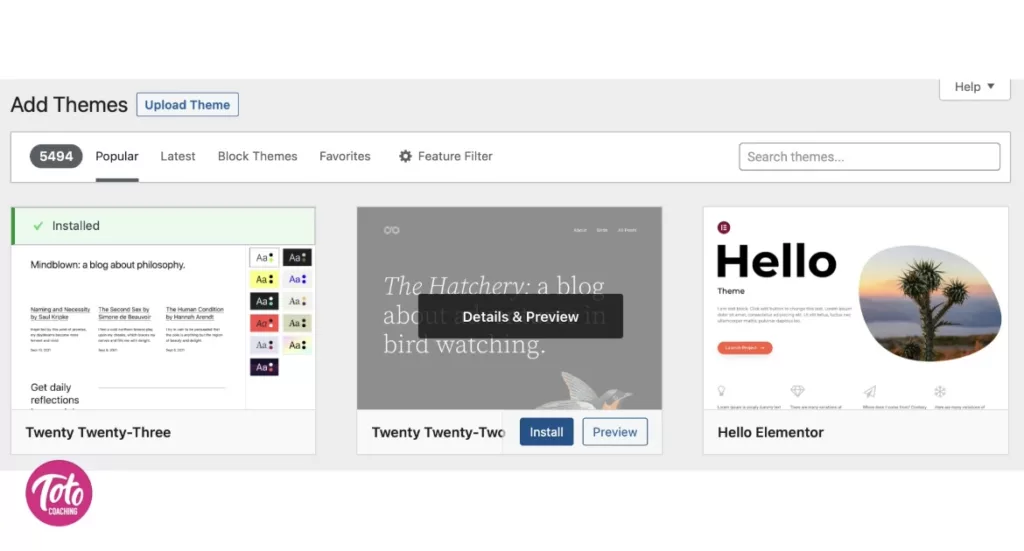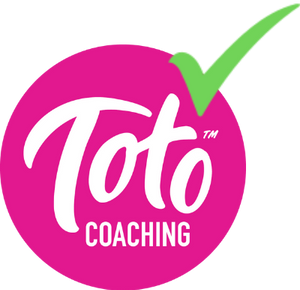Watch this video or read the article below
Transcript
There are many other factors to consider when choosing a theme for a website, and let’s go over a few things that you should look for in a theme. When you’re choosing a theme for your website, it’s important to carefully consider the specific needs and the goals of the site, and what you want the visitor to do on your website.
Evaluate your target audience with your buyer personas that you have created, and the tables that we’ve created, and think about the type of content that will be featured on your website. special features or functionalities that might be required. First, you want to look at the features and functionality of the theme.
Functionality, that refers to the various features and the tools your website requires you to perform its intended purpose. Different industries might be looking for different features in a website theme. For example, a restaurant might prioritize a theme with a built in menu. and a reservation system.
While a photography portfolio might need a theme that showcases high quality images with a sleek modern layout. An online store will need a shopping cart, payment processing, a blog might need a commenting system. So you can see as It’s important to have a clear understanding of the features that you need before you choose the theme.
And you want to be sure to choose a theme that is designed specifically for your industry, or it can be easily customized to fit your needs. So think about the functionality that you need for your website first, before you go ahead and choose your theme. Once you’ve determined the functionality you need, the next step is to consider the visual design of your website theme.
The design should be visually appealing and consistent with your brand’s identity. This includes fonts, colors, overall style. A professional and clean design is essential for creating a positive first impression, ensuring that your visitors have a pleasant experience navigating your site. We keep talking about that, right?
Most likely, you’ve looked at themes and considered the user experience already. The theme should enhance the user experience by providing an intuitive and easy to navigate layout. This includes ensuring that the layout is logical and consistent, and that design elements do not distract from the content of the website.
Let’s go over this a little more in detail
Building a website is crucial for any modern business, and selecting the right website theme is a key factor in creating a successful online presence. A website theme is a pre-designed template that determines the look, feel, and functionality of your site. Choosing the best website theme for your business can significantly impact user experience, branding, and overall effectiveness.
Understanding the Importance of Website Themes
Before looking into the selection process, it’s important to understand why choosing the best website theme for your business matters. A well-designed theme can:
1. Enhance user experience (UX) and user interface (UI): A well-designed website theme can greatly improve the overall user experience (UX) and user interface (UI) of your website. The theme’s layout, navigation, and visual elements play a crucial role in how visitors interact with and perceive your site. A theme with a clean, intuitive design and easy-to-use interface can enhance engagement, reduce bounce rates, and encourage visitors to explore your content further.
2. Align with your brand’s identity and messaging: Your website is often the first point of contact between your business and potential customers. A theme that aligns with your brand’s identity and messaging can help reinforce your brand’s personality, values, and unique selling proposition. By choosing a theme with colors, typography, and overall aesthetics that complement your branding, you create a cohesive and professional online presence that resonates with your target audience.
3. Provide necessary features and functionalities:Different types of websites require different features and functionalities. For example, an e-commerce website needs a shopping cart, product catalog, and payment gateway integration, while a portfolio website might prioritize image galleries and project showcases. A well-designed theme should offer the essential features and functionalities required for your specific business needs, ensuring that your website can effectively serve its intended purpose.
4. Ensure optimal performance and loading times:In today’s digital age, website performance and loading times are crucial factors that can impact user experience, search engine rankings, and overall online success. A well-optimized theme, with clean code and optimized assets, can significantly improve your website’s speed and performance. Faster loading times not only enhance user experience but can also positively impact search engine optimization (SEO) and conversion rates.
5. Facilitate easy customization and future updates:As your business grows and evolves, you may need to update or modify certain aspects of your website. A theme that offers easy customization options, such as drag-and-drop builders, theme options panels, or support for custom CSS and code snippets, can save you time and resources in the long run. Additionally, a theme that receives regular updates and support from the developers can ensure compatibility with the latest web standards and security patches, future-proofing your website.
By investing time and effort into selecting the best website theme for your business, you’re setting the foundation for a professional, engaging, and user-friendly online presence.
Identifying Your Business Needs and Goals
The first step in choosing the best website theme for your business is to clearly define your needs and goals. Consider the following questions:
– What is the primary purpose of your website? (e.g., e-commerce, portfolio, blog, informational)
– Who is your target audience, and what are their expectations?
– What type of content and features will your website feature?
– Do you have specific branding guidelines or design preferences?
– What level of customization and flexibility do you require?
By answering these questions, you’ll gain a better understanding of the essential features, functionalities, and design elements required for your website theme.
Evaluating Theme Features and Functionality
Once you’ve identified your business needs and goals, it’s time to evaluate the features and functionality of potential website themes. Different industries and website types may prioritize different features. For example:
– E-commerce websites: Shopping cart, payment gateways, product catalogs, and inventory management
– Portfolios: Image galleries, project showcases, and client testimonials
– Blogs: Commenting systems, social media integration, and content organization
– Business websites: Contact forms, Google Maps integration, and team member profiles
Ensure that the theme you choose offers the necessary features and functionality to support your website’s intended purpose.
Choosing the Right Theme with Expert Guidance
While this guide provides an overview of the essential factors to consider when selecting a website theme, the process can be complex, especially for those new to website building or those with specific business requirements. If you’re looking for in-depth guidance and personalized support, consider signing up for our Toto Full Web Building Course with Live Coaching.
Our comprehensive courses delve deeper into the various types of themes available, the intricacies of theme customization, and the best practices for choosing a theme that aligns with your brand, industry, and business goals. With live coaching and hands-on exercises, you’ll gain the knowledge and skills necessary to confidently navigate the theme selection process and create a website that truly reflects your vision.
Alternatively, you can sign-up for our lifeime access course, Building DIY Websites,this particular course teaches you how to set up and build on WordPress and we walk you through it step-by-step.
Assessing Visual Design and Branding Alignment
A visually appealing and brand-aligned design is crucial for creating a positive first impression and ensuring visitors have a pleasant experience navigating your site. When evaluating website themes, consider the following design aspects:
1. Color schemes and typography
2. Overall aesthetic and style (e.g., modern, minimalist, classic)
3. Layout and navigation structure
4. Mobile responsiveness and cross-device compatibility
The theme’s design should complement your brand’s identity, values, and messaging. It should also enhance the user experience by providing an intuitive and consistent layout.
Customization Options and Flexibility
While website themes provide a solid foundation, you may need to tailor the design and functionality to meet your specific requirements. Look for themes that offer:
1. Easy-to-use customization options (e.g., drag-and-drop builders, theme options panel)
2. Ability to modify color schemes, fonts, and layout
3. Support for custom CSS and code snippets (for more advanced customizations)
4. Integration with popular plugins and third-party tools
Themes with robust customization options allow you to create a unique and tailored online presence without extensive technical knowledge or coding expertise.
Performance and Page Load Times
In today’s fast-paced digital landscape, website performance and page load times are critical factors influencing user experience and search engine rankings. When choosing a website theme, consider:
1. Theme code quality and optimization
2. Compatibility with performance best practices (e.g., minification, caching)
3. Reviews and benchmarks related to page load times
4. Availability of performance optimization plugins or tools
A well-optimized theme can significantly improve your website’s speed and overall user experience, leading to higher engagement and better search engine visibility.
Support, Documentation, and Community
Reliable support, comprehensive documentation, and an active community can save you time and frustration when encountering issues or needing guidance. Evaluate the following aspects:
1. Developer support channels (e.g., forums, email, live chat)
2. Frequency and quality of theme updates
3. Availability of detailed documentation and tutorials
4. Active user community for peer support and resources
Choosing a well-supported theme ensures that you have access to timely assistance and resources, making it easier to maintain and update your website over time.
Reviewing Ratings, Reviews, and Popularity
Before making a final decision, it’s essential to research the reputation and popularity of the website theme you’re considering. Look for:
1. User ratings and reviews on reputable marketplaces or repositories
2. Popularity metrics (e.g., number of sales, active installations)
3. Case studies or success stories from businesses in your industry
Positive reviews, high ratings, and widespread adoption can indicate a theme’s quality, reliability, and suitability for your business needs.
By following this ultimate guide, you’ll be well-equipped to evaluate potential themes based on features, functionality, design, customization options, performance, support, and community feedback. Remember, investing time and effort into selecting the right theme will pay dividends in the form of a professional, engaging, and user-friendly website that aligns with your brand and business goals.
Good luck, and happy website building!
This is the Toto way.

Former Web Development Agency Owner
Founder of Toto Coaching
Founder of Toto SEO
Jennifer DeRosa
Jennifer is the author of "Building DIY Websites for Dummies," a new addition to the renowned "for dummies" series.
She is also the visionary behind Toto SEO and Toto Coaching. As the founder of Toto SEO, she specializes in offering SEO solutions tailored for small businesses. Through Toto Coaching, she provides an interactive online course, complete with weekly coaching sessions, empowering small businesses and entrepreneurs to craft websites that not only presell their offerings but also foster trust among their clientele.
Jennifer's thirst for knowledge recently led her to complete a program on No Code Artificial Intelligence and Machine Learning at the prestigious MIT University.
Before her current ventures, Jennifer was the driving force behind TechCare, a web development agency she founded and led from 2001 to 2021, when she had a successful Exit.
Her career also includes consulting roles with industry giants such as Mercedes Benz Credit Corporation, US Surgical, GTE, GE Capital, Unilever, and Calvin Klein.
She is a frequent speaker for WordPress Meetups, SCORE, and others.
Are You Searching the Internet for Help Building Your Website or Making it Better?
We are here to help you!!
Check out the entire DIY Website Building Course
where we walk you through building a website
from Start to Finish!
What are you waiting for? Let's get your website built!!


